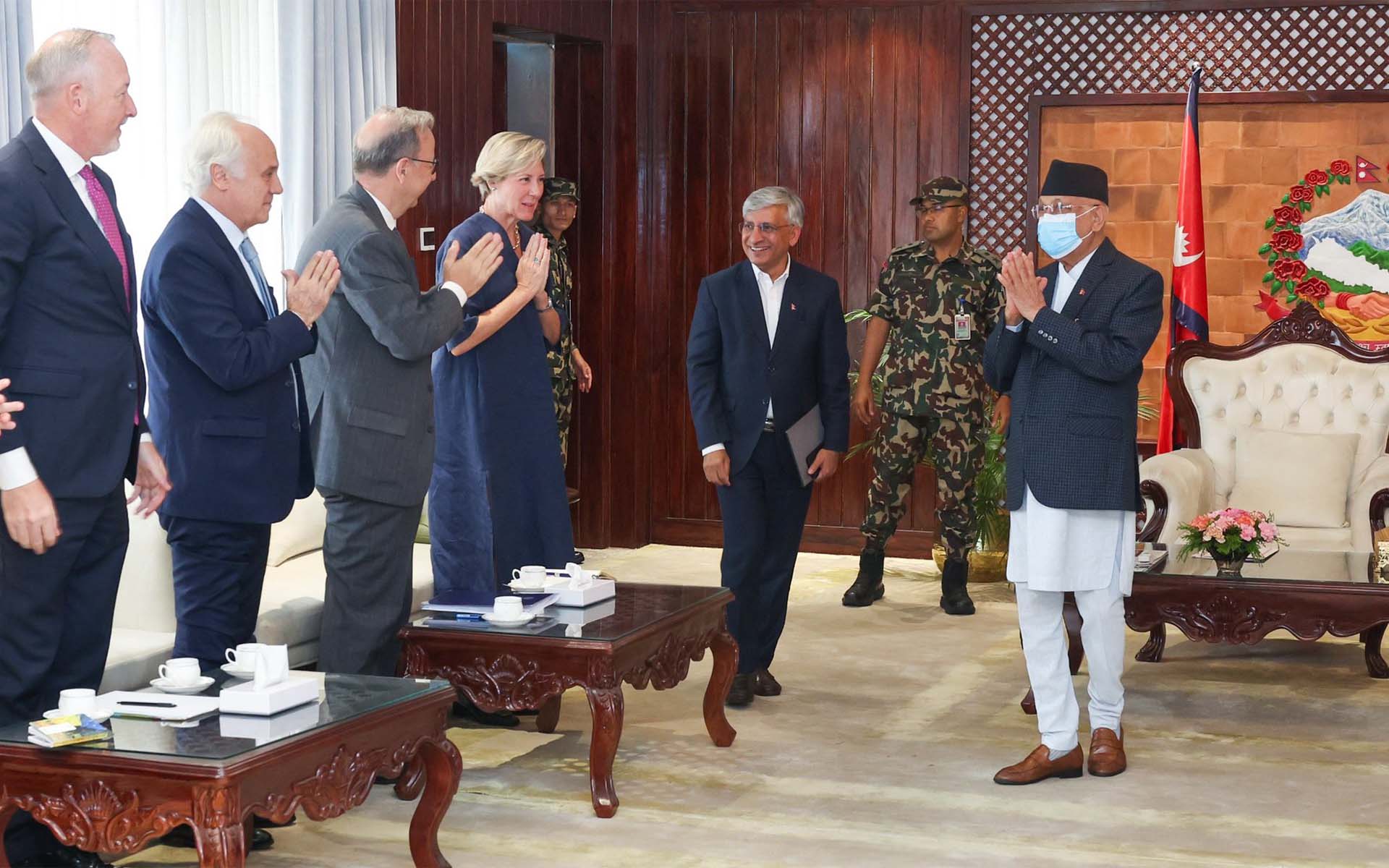
Nepal and the European Union (EU) celebrated the golden jubilee of their relations in 2024. Since 1974, Nepal has been a trusted partner of the EU. The EU, a 27-member regional organization, has long supported Nepal’s economic and development goals by aligning with the country’s priorities and upholding shared values such as democracy, human rights, transparency, and accountability. Since Nepal adopted the Constitution in 2015, the EU has also been instrumental in supporting Nepal’s transition to federalism.
Moreover, the political and economic relations between Nepal and the EU date back to 1994, which was followed by a cooperation agreement in 1996. The European Economic Community evolved into the European Union in 1993 and developed its common foreign and security policy by 2010. Nepal, a SAARC member, engages with the EU bilaterally, regionally, and multilaterally. The EU has been an observer in SAARC since 2007, fostering regional collaboration. Bilateral relations have grown, boosted by the Nepali diaspora in Europe.
According to Ambassador of the EU to Nepal, Veronique Lorenzo, the EU is trying to promote regional integration. “We are friends, and we have common fundamental values. Proud and attached to law, democracy, and human rights. These are the things which unite us,” Lorenzo added. The ambassador also commented that the EU’s relationship with Nepal has progressed and will evolve further.
Post-Brexit, four EU countries have embassies in Kathmandu – Finland, France, Germany, and Switzerland – alongside the EU mission. The United Kingdom, Norway, and Russia also have residential embassies, while Denmark, which once had a residential mission, withdrew it in 2017. The EU mission in Nepal coordinates with resident embassies and Honorary Consul Generals’ offices in Kathmandu to strengthen relations.
Similarly, Nepal has eight resident missions in Europe, including two UN Permanent Missions to the UN in Vienna and Geneva. Other missions are in Brussels (which also serves as the mission to the EU), Copenhagen, Paris, Berlin, Madrid, and Lisbon. Nepal has two more missions – London and Moscow – in Europe besides the EU.
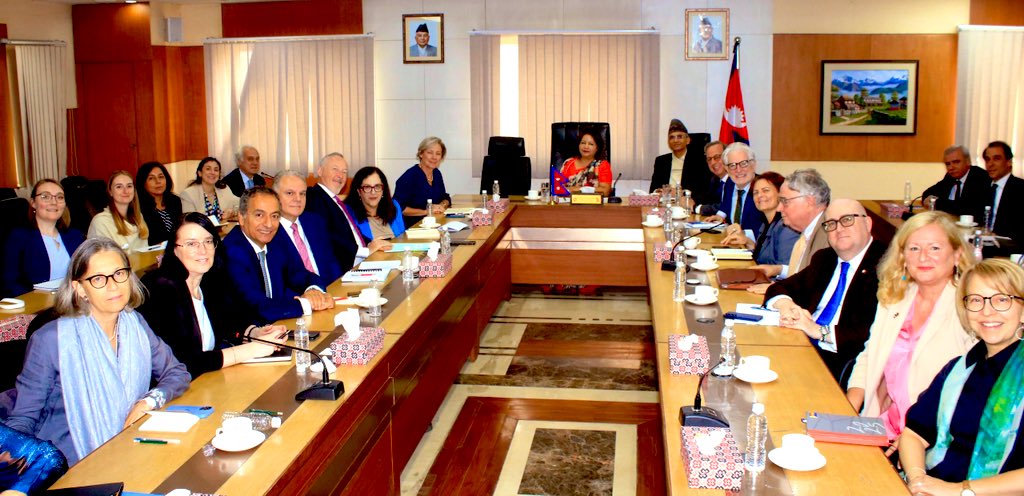
The EU first opened its Technical Office in Kathmandu in 1992. Nepal, too, established its Brussels embassy the same year. The EU Delegation in Nepal was established in 2002 and upgraded to ambassadorial level in 2009.
“Nepal-EU relations have remained friendly and cooperative, based on mutual understanding and support in economy, trade, humanitarian, and development issues,” notes Nepal’s Foreign Ministry. The EU has been a development partner since 1973, with frequent official exchanges. The next year, in 1974, Nepal-EU (the then European Community) established diplomatic relations.
Dr. Rupak Sapkota, former advisor to Nepal’s Prime Minister, stressed that Nepal can strengthen the partnership by aligning shared priorities that advance Nepal’s goals, including LDC graduation, sustainable development, and green economic growth, while addressing global challenges.
There have been frequent high-level exchanges between the EU and Nepal in recent times. Prime Minister K.P. Sharma Oli recently attended the 4th International Conference on Financing for Development (FFD4) in Sevilla, Spain. The event took place between June 30 and July 3 of 2025. During his visit to Spain, PM Oli met Spanish Prime Minister Pedro Sánchez to discuss bilateral ties. He also met Portugal’s Prime Minister Luís Montenegro and Estonia’s President Alar Karis to discuss ways to deepen ties and expand cooperation.
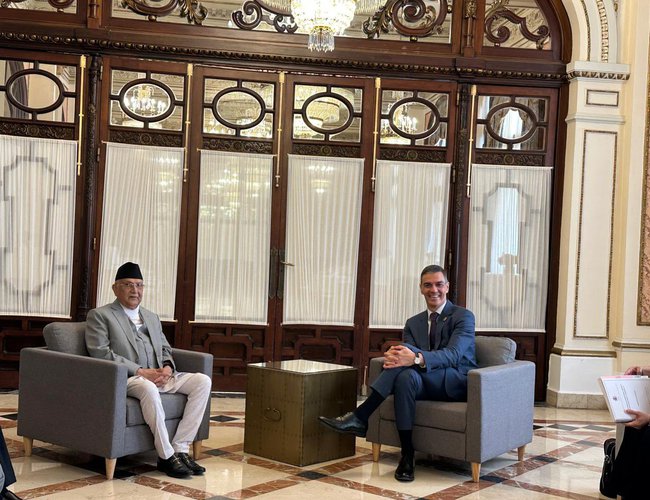
PM Oli had previously visited Europe in June 2019, attending the ILO Centenary Session in Geneva and visiting France and the UK.
Simultaneously, the Foreign Minister of Nepal, Dr. Arzu Rana Deuba, visited Europe to attend the 44th Food and Agriculture Organisation (FAO) session in Rome. She then visited Germany where she met with German Foreign Minister Dr. Johann David Wadephul in Berlin. Their discussions focused on trade, development, tourism, climate change, and multilateral cooperation. Dr. Rana expressed her gratitude to Germany for its longstanding development partnership in economic, social, and other sectors.
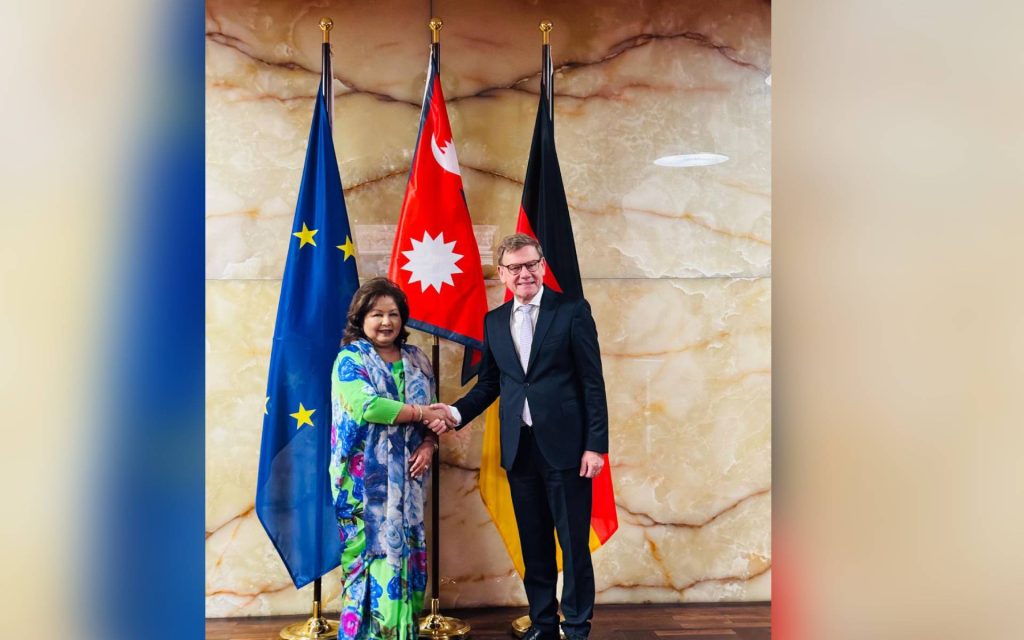
Similarly, Nepal’s President Ram Chandra Poudel visited the EU in 2024 during the 112th session of the International Labour Organisation in Geneva. During the visit, he held bilateral talks with the President of the Swiss Confederation, Viola Amherd. Later, he also visited Germany where he held a meeting with German President Frank-Walter Steinmeier, discussing bilateral relations, while expressing gratitude for Germany’s continued support to Nepal.
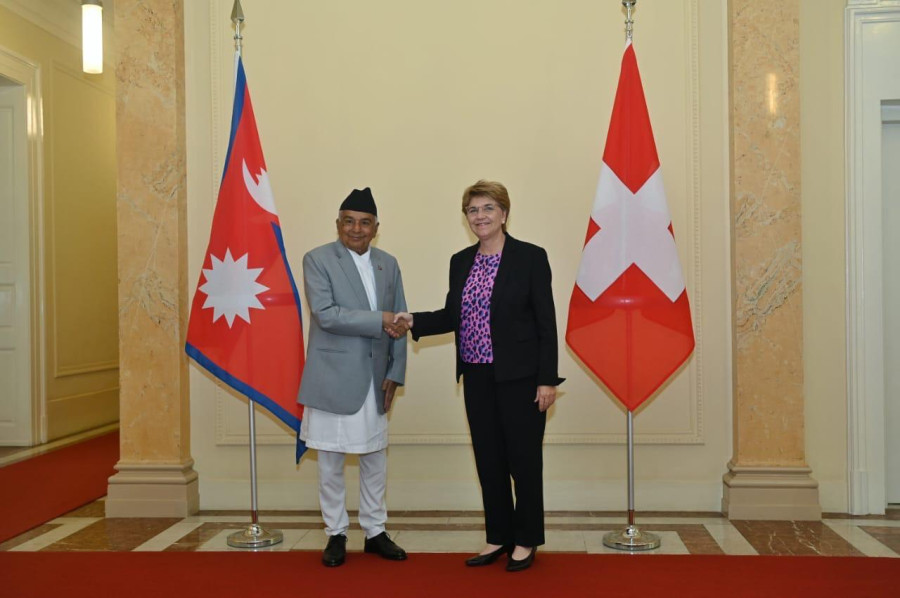
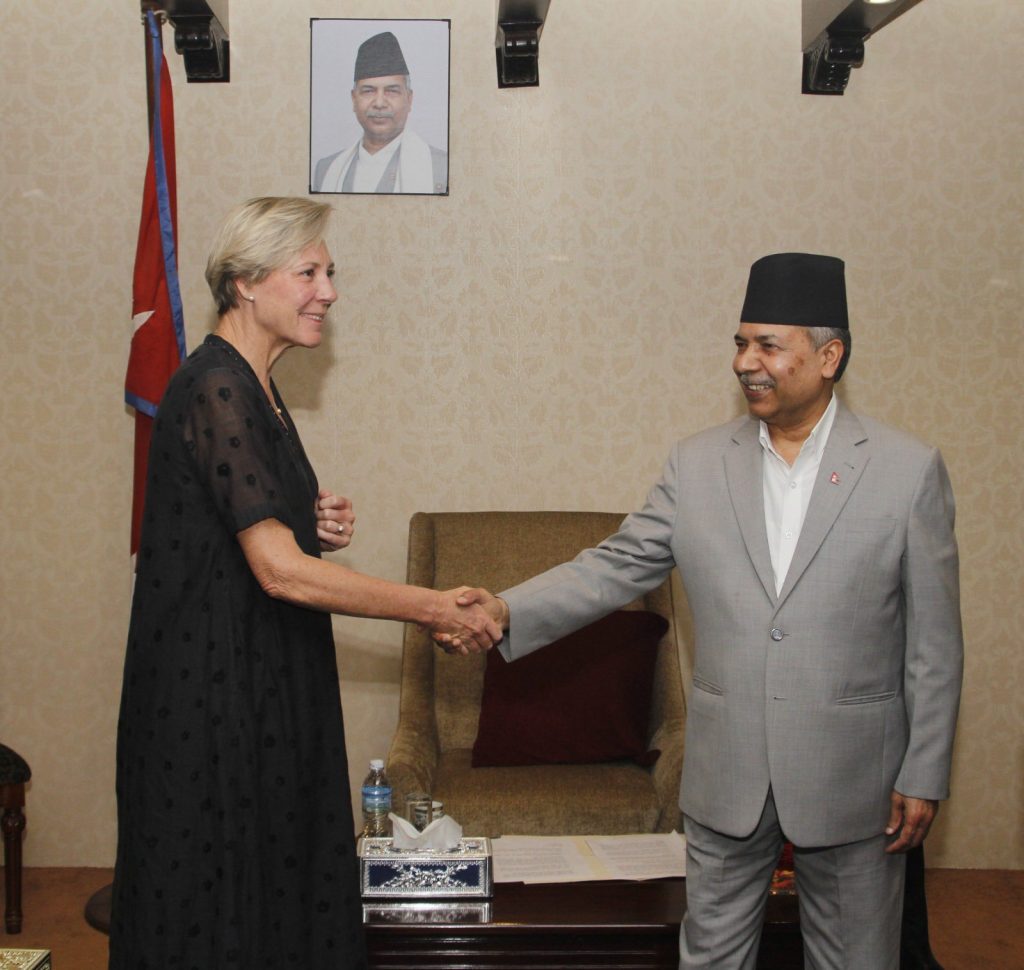
In January 2020, the visiting Minister of Foreign and European Affairs of Luxembourg, Jean Asselborn, held bilateral talks with Minister of Foreign Affairs Pradeep Kumar Gyawali in his two-day official visit to Nepal. The same year in June, Foreign Minister Gyawali spoke by phone with Josep Borrell, EU High Representative for Foreign Affairs, discussing Nepal-EU cooperation amid COVID-19. Issues related to Nepal-EU relations and cooperation, particularly in the context of COVID-19, were discussed. In 2018, Foreign Minister Gyawali met with Federica Mogherini, Vice President of the European Commission and High Representative for Foreign Affairs and Security Policy, in Brussels.
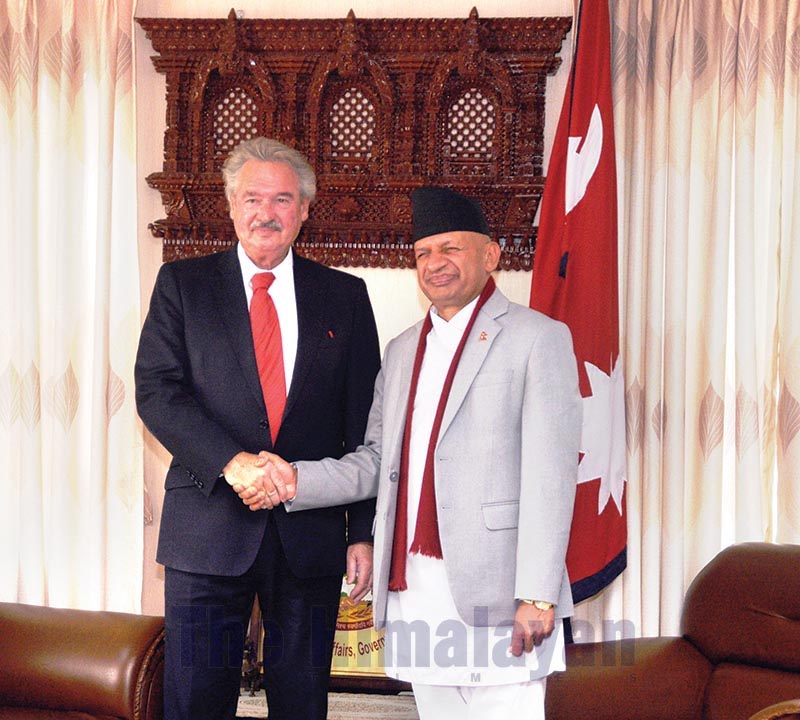
From the EU side, Paola Pampaloni, Deputy Managing Director for Asia and Pacific of the EU External Affairs Service, visited Nepal thrice in 2019, 2021, and 2024 for the 11th, 13th, and 15th Nepal-EU Joint Commission meetings, respectively, focusing on political, development, air safety, and LDC graduation issues.
In September 2022, four Members of the European Parliament, led by Vice-President Evelyn Regner, visited Nepal, engaging with government and civil society leaders. In February 2023, EU Commissioner for International Partnerships Jutta Urpilainen became the first European Commissioner to visit Nepal, meeting Nepal’s President, Prime Minister, and Foreign Minister, emphasizing green recovery, nutrition, education, and EU programs.
The EU and its member states have long provided development aid to Nepal, either through the EU or directly from respective countries. The Multi-Annual Indicative Programme (MIP) 2014-2020, signed during EU Development Commissioner Andris Piebalgs’ visit in 2015, focused on Sustainable Rural Development, Education, and Strengthening Democracy and Decentralization.
At the 15th EU-Nepal Joint Commission in 2023, both sides reaffirmed their commitment to democracy, human rights, good governance, SDGs, investment promotion, and addressing global challenges such as climate change. Nepal shared its progress and challenges in realization of the SDGs.
The EU welcomed Nepal’s Transition Strategy for LDC graduation and committed to continuing cooperation through the new MIP 2021-2027, aligned with Nepal’s national plans. The meeting also acknowledged the Sub-commission meeting on development cooperation held on 6 March, while Nepal appreciated the MIP for aligning with the plans and priorities of the Government of Nepal.
The EU’s Global Gateway initiative, launched in 2021, aims to mobilize €300 billion globally by 2027 in support of digital, energy, education, and health infrastructure. In Nepal, it supports climate-resilient growth, education, and green energy.
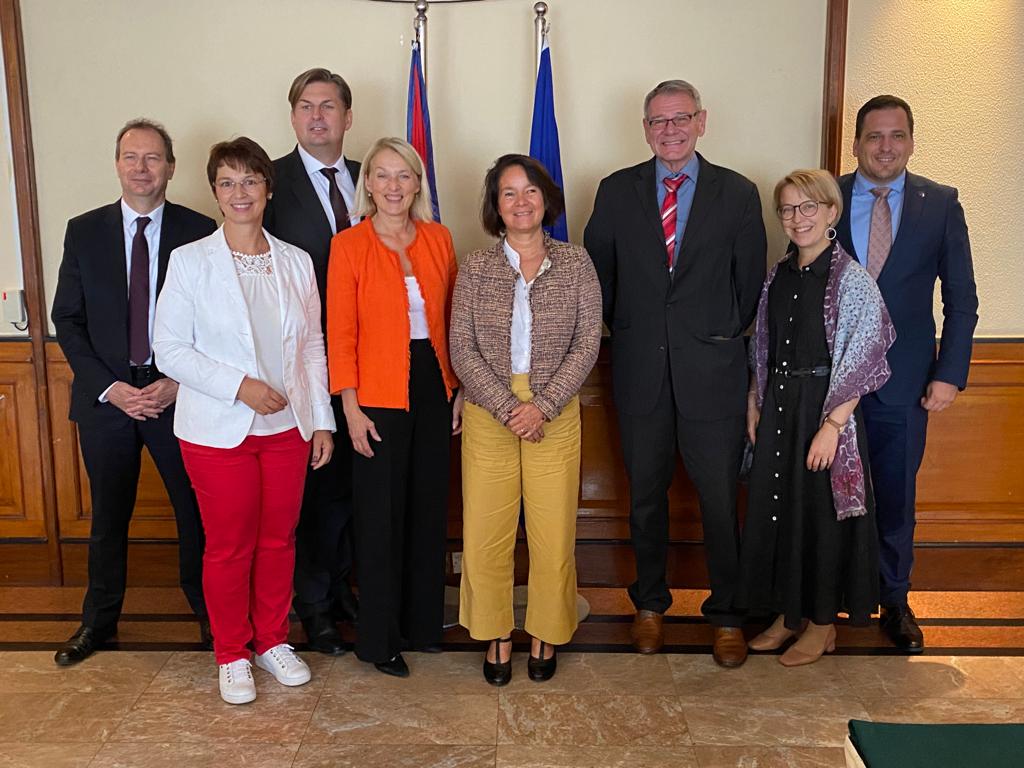
– ‘Quality Education for All’ (€50 million) – focusing on teacher training and local education governance.
– Efficient Transmission of Electricity (€2.4 million) – a joint project with KfW and EIB in Bagmati province to reduce fossil fuel reliance and improve grid efficiency.
– GREEN (€4 million) – promoting private sector investment in renewable energy across multiple provinces.
– Green Resilient Energy for Economic Prosperity (€23.6 million) – enhancing power evacuation in Bharatpur, Butwal, and Pokhara.
– SASEC Electricity Transmission Project (€20.9 million) – expanding grid coverage in Karnali and Lumbini to reduce energy poverty and support cross-border trade.
Moreover, Former Ambassador of Nepal to Denmark, Yuba Nath Lamsal, noted the long history and strong bonds of Nepal-EU relations. However, with geopolitical shifts and conflict in Europe, he says the EU may focus more internally, possibly reducing foreign aid. “Since they are expected to focus more on their own defence, foreign aid is likely to dwindle. This will have an impact on Nepal as well. Though friendly relations will continue, the volume of economic cooperation from the EU as such and EU countries is likely to be slashed in the future,” he added.
The EU is one of Nepal’s major trading partners. As per government data, Nepal mainly exports handmade carpets, textiles, gems, jewelry, wood, paper, and leather products to the EU, while importing engineering goods, telecom equipment, chemicals, metals, and agricultural products.
On July 14, German Ambassador Dr. Michael Koch met with the Truth and Reconciliation Commission (TRC) team, led by Chairperson Mahesh Thapa, to discuss the ongoing Transitional Justice process. At the meeting, Ambassador Koch reaffirmed Germany’s continued support and expressed hope for further progress in ensuring truth, justice, and reconciliation in Nepal.
The EU and its member states continue to support Nepal’s Transitional Justice process and closely follow the activities of the TRC and the Commission on the Investigation of Enforced Disappeared Persons (CIEDP). The two commissions were established in 2015 to address human rights violations from the 1996–2006 Maoist conflict. However, nearly two decades after the peace accord between the government and the Maoists, Nepal has yet to conclude the process.
Political disagreements and differing positions among victims have delayed progress. In an effort to move forward, Nepal’s Federal Parliament endorsed the amended TJ law on August 14, 2024. A week later, the bill was unanimously passed. Nine countries and the EU welcomed the law’s passage, expressing readiness to support its implementation and highlighting the importance of victim participation in decision-making.
In a joint statement, the USA, Switzerland, Australia, UK, Norway, Japan, Finland, EU, Germany, and France expressed support for the amendment to the TRC Act. “The undersigned welcome the Investigation of Disappeared Persons, Truth and Reconciliation Commission Act 2071 (Amendment) Bill passed with consensus by both houses of the Federal Parliament of Nepal,” the statement read. They stressed that now is the time for all stakeholders to work together to bring this chapter of Nepal’s history to a close. With new officials appointed to both commissions, the TJ process has now regained momentum.
Moreover, the EU has also contributed to Nepal’s peace process through the Nepal Peace Trust Fund (NPTF). The EU has provided around Rs. 2.22 billion (22 million EURO) financial support for Nepal. The support was provided through the Ministry of Finance of Nepal. The EU also provided additional funding for specific projects under the NPTF. In 2009, additionally, the EU provided Rs. 652 million (EURO 5.95 million) for the peace process.
The Nepal government had formed NPTF, where multi-donor agencies can contribute. The responsibility of NPTF was focusing on four key areas– Social Dimensions/Conflict Affected Peoples (CAPs), Transitional Justice and Reconciliation, Access to Security, and the Political dimension.
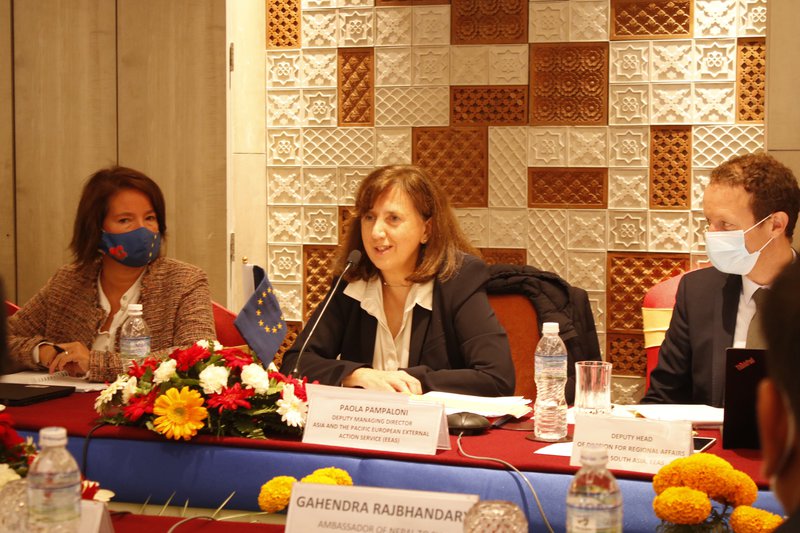
Regarding the development of the TJ process, EU Ambassador to Nepal, Veronique Lorenzo, acknowledged the presentation of Nepal’s peace process. Chiranjibi Bhandari, an Assistant Professor at the Central Department of Conflict, Peace and Development Studies of Tribhuvan University and also the principal investigator of the Research Report “Transitional Justice in Nepal: Stumbling Blocks and Way Forward—2024,” emphasized the shared responsibility of government and civil society to support victims. He also urged reflection on why the commissions failed in the past and how to improve future efforts. He added, “It is the stakeholders’ collective responsibility to explore why both commissions failed in the past to accomplish their tasks and how upcoming commissions can better ensure the smooth operation of the process.” Nepal must continue engaging with the EU to resolve the long-pending TJ process.
The EU has banned Nepali airlines since December 2014, raising aviation safety concerns, a ban that remains in place to this day. This affects not only air access to Europe but also the arrival of EU tourists in Nepal.
The ban followed Nepal’s failure to meet international aviation safety standards set by the International Civil Aviation Organization (ICAO). EU has also shown concern over the structure and dual role of the Civil Aviation Authority of Nepal (CAAN) as both regulator and service provider, leading to a conflict of interest.
To address the issue, the Government of Nepal introduced a safety program. However, the EU and its technical team remain unsatisfied with the attempt. As a result, the ban remains. EU Ambassador to Nepal Lorenzo noted that the EU wants Nepal to grow in tourism and to receive tourists from the EU. “That is a small irritant in the relationship. But we want Nepal to grow in tourism. To be able to get our tourists.” She further added that measures still need to be adopted by CAAN to meet minimum standards, as it is all about passenger safety. “Our joint objective is to remove Nepal from the air safety list,” stressed the EU Ambassador.
During her visit to Germany in July, Nepal’s Foreign Minister Dr. Rana raised the issue with German Foreign Minister Dr. Johann David Wadephul. She requested Germany’s support in establishing direct air connectivity and urged support in lifting the EU ban on Nepali airlines. She informed that Nepal has introduced two new bills in parliament to reform its civil aviation sector in line with EU and ICAO recommendations, and appealed to Germany, as a key EU member, to advocate for the ban’s removal. Minister Wadephul responded positively and assured Nepal of Germany’s assistance on this matter.
Despite the ban, Nepal welcomed more European tourists in 2024 than the previous year. Tourists from Germany, France, Italy, Spain, and the Netherlands reached nearly 95,000 in total, according to Nepal Tourism Board data.
The 15th EU–Nepal Joint Commission in Kathmandu last year also underlined air safety as a key area of cooperation. Nepal assured the EU it would address the findings of the 2023 EU assessment mission. Both sides agreed to continue engagement at the technical level, and it is expected that more tourists will arrive in Nepal from the EU following the lifting of the issue.
Beyond aviation, the EU has stood with Nepal during major crises, including the 2015 earthquake, the 2023 Jajarkot earthquake, and the COVID-19 pandemic. The EU also provides Erasmus fellowships for young Nepali students. Likewise, the growing Nepali diaspora in the EU plays a growing role in bilateral ties, with many returning to invest in Nepal. Unofficially, around a hundred thousand Nepalis are residing in European countries, including the UK.
Former Ambassador to Denmark Yuba Nath Lamsal noted, “There is no problem in Nepal’s relations with the EU at present and none is expected in the near future. Goodwill and friendship between Nepal and the EU will continue even in the future. However, Nepal is yet to receive the level of cooperation from the EU and its member countries that it deserves.”
He added that due to its global and geopolitical importance, Nepal must strengthen its diplomatic efforts in Europe to attract greater attention and support. He further said that if Nepal performs well diplomatically, European focus on Asia, which has shifted from the region in recent times, can return.